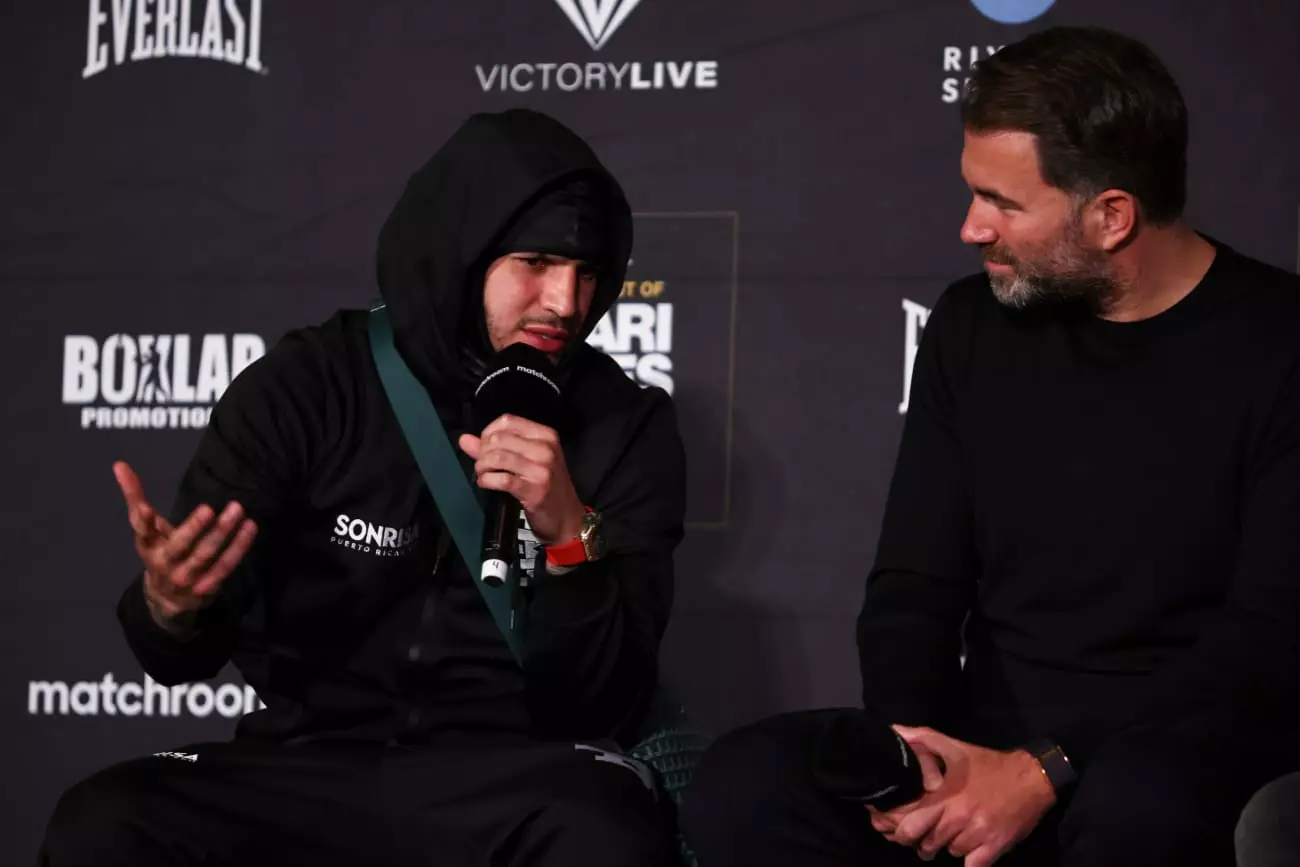Edgar Berlanga has never been one to shy away from controversy, but his recent criticisms of promoter Eddie Hearn seem to go beyond mere frustration; they embody a deep-seated ambition that is both alarming and revealing. In a recent interview, Berlanga laid bare his grievances, contending that Hearn failed to secure a crucial fight against IBF super middleweight champion William Scull. This fight, in Berlanga’s view, could have catapulted him back into the limelight and paved the way for a lucrative rematch with the titan of boxing, Canelo Alvarez. Berlanga’s rhetoric implies that he views the promotion and management of his career through a lens befitting a cutthroat business. However, he seems to miss the intrinsic connection between fighter and promoter—the partnership that can make or break a boxing career.
Berlanga’s assertion that Hearn has treated him as an employee rather than a collaborator points to a wider issue in boxing: the often strained relationship between fighters and promoters. While Berlanga yearns to portray himself as the “boss” of his career, it’s essential to unpack whether this self-perception is grounded in reality or simply a defense mechanism. Fighters, no matter how talented, often lack the experience needed to navigate the tumultuous waters of promotional dealings. Berlanga’s overconfidence raises eyebrows; the transitional battle from being a fighter to a self-proclaimed “businessman” is nuanced and riddled with pitfalls.
Discontent and Self-Sabotage: A Fighter’s Dilemma
With a record of 22 wins and just one loss, Berlanga rightly believes he possesses the skill to contend with top-tier opponents. Yet, his comments reveal a certain naiveté; he seems to hold an idealistic view of what could have been while conveniently overlooking the complexities tied to match negotiations. The reality is that even with a victory over Scull, the most significant question looms: Would Canelo actually consider a rematch, let alone be willing to stake his reputation against a Fighter with a relatively spotty record of notable victories?
Berlanga’s frustration at being reduced to an undercard fight speaks volumes about his expectations. After earning a hefty $10 million in his previous matchup with Canelo last September, any dip in perceived status can sting. However, boxing is unforgiving, and the status of a fighter is often dictated by more than past earnings alone. Berlanga’s insistence that he should headline his own show in Puerto Rico, despite being informed that DAZN wouldn’t back it, illustrates not only his ambition but also a disconnect with the present landscape of the sport.
One must wonder if Berlanga’s expectations are inflated or if he is simply unaware of the grinding realities faced by even the most promising fighters. In boxing, confidence must coexist with a keen understanding of market dynamics and fan engagement, neither of which guarantees success. Berlanga’s comments about slaughtering opponents like Caleb Plant and Jaime Munguia sound punchy and tenacious, but they may also serve as a mask for deeper insecurities regarding his actual standing in the world of boxing.
Life Beyond Matchroom: Navigating New Horizons
As Berlanga prepares to fight Jonathan Gonzalez-Ortiz, he is on the cusp of a new chapter. With his contract with Matchroom coming to an end, the fighter sees an opportunity to take control of his career narrative—one that he feels has been dictated by external forces. In theory, becoming a free agent allows Berlanga a level of autonomy he has been craving. However, the question remains: Can he leverage this newfound freedom to land the high-profile fights that will propel him back into the limelight?
His provocative invitation to television networks and other promoters following his last fight with Matchroom is indicative of both his determination and his vulnerability. A fighter without a title and who has dodged notable contenders cannot simply assume that their name alone is enough to draw attention. Berlanga’s best victory—a decision win over Padraig McCrory—isn’t enough to solidify his status as a marketable star.
What Berlanga needs is a strategic vision to complement his raw talent, ensuring he doesn’t fall into the same pitfalls of underwhelming matchmaking that he’s criticized. The desire for independence is admirable, but he should temper it with realism. Ambitious fighters often find themselves overwhelmed in a sea of choices, where one wrong decision could lead to further stagnation. Berlanga’s career trajectory depends not only on his fighting prowess but on the quality of decisions he makes moving forward.
The Financial Gamble: Risks and Rewards in Boxing
Berlanga’s fixation on monetary rewards adds another layer to his struggle. He feels that if only his promoter had recognized the financial opportunities available, he would already be en route to glory. This notion resonates but often overshadows the essence of what boxing should be—a gladiatorial sport demanding grit, determination, and resilience, rather than merely a means to cash in on paydays. Boxers have become increasingly aware that their worth is not simply about profits but also about legacy and impact within the sport.
However, Berlanga’s comments reflect more than just a desire for financial gain; they expose the complications that arise in the realm of ego. Fighting isn’t purely a business, nor should it be. The desire for retribution against Canelo may play a significant role in motivating Berlanga, yet chasing rematches based on lucrative payouts, rather than combatative grudges or sporting rivalries, dilutes the heart of boxing itself.
As Berlanga approaches the next phase of his career, he would do well to remember that ambition without a grounded foundation can lead to delusion. To elevate himself from the murky waters of undercard bouts and lost opportunities, he must temper his aspirations with practicality and a genuine desire to grow not only as a boxer but as a figure of integrity within the boxing community. The real battle may not be in the ring but in carving out a path that honors both ambition and the spirit of competition.


Leave a Reply